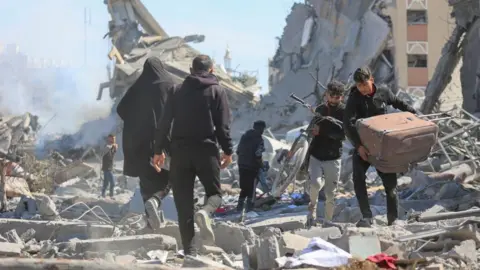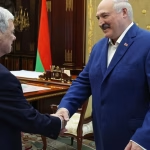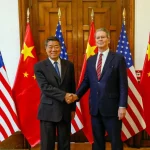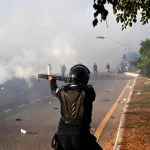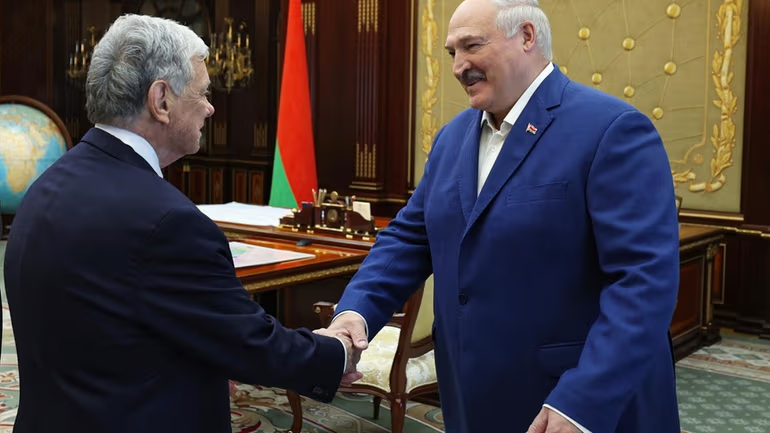The report presents a detailed and harsh assessment, arguing that Israel is committing genocide in Gaza. It claims Israel has violated the Genocide Convention, adopted in 1948 by the newly formed United Nations, a treaty shaped in response to the Nazi extermination of six million Jews.
- Israel and Palestine: A Historical Overview of the Conflict
- How Israeli Policies Fueled Gaza’s Hunger Crisis
- A Story of War and Human Cost
- The UN Genocide Convention: What It Means
- Jeremy Bowen’s Analysis: A Scathing Verdict
- International Reactions
- Legal Consequences: Could Israel Face Trial?
- The Historical Lens: Gaza’s Endless Wars
- Media and Public Opinion
- Expert Voices
- The Israeli Perspective
- Why This Report Matters
- FAQs
- What did the UN genocide report conclude about Israel’s Gaza campaign?
- Why is Jeremy Bowen’s analysis significant?
- Could Israeli leaders face trial at the International Criminal Court?
- How has the international community responded?
- Does the report ignore Hamas’s actions?
- Conclusion:
Israel strongly rejects these accusations, insisting its military actions comply with international law. It maintains that its operations are acts of self-defence, aimed at protecting its citizens and pressuring Hamas and Islamic Jihad to release hostages taken on 7 October 2023, of whom about 20 are believed to remain alive.
Israeli officials have dismissed the report as antisemitic propaganda driven by Hamas. The findings were produced by a UN Human Rights Council commission of inquiry, which Israel and the United States refuse to engage with, accusing the body of long-standing bias.
Israel and Palestine: A Historical Overview of the Conflict
The Israel-Palestine conflict is one of the world’s longest-running and most complex disputes, rooted in competing claims to the same land. Its origins trace back to the late 19th and early 20th centuries, when waves of Jewish migration to Palestine increased under Ottoman rule and later British control. Tensions deepened after the 1947 UN partition plan, which proposed separate Jewish and Arab states, and the subsequent Arab-Israeli war of 1948 that created the state of Israel and displaced hundreds of thousands of Palestinians. Since then, wars, uprisings, peace efforts, and failed negotiations have shaped the struggle, leaving deep scars and unresolved issues such as borders, refugees, settlements, and the status of Jerusalem.
How Israeli Policies Fueled Gaza’s Hunger Crisis
Gaza’s worsening hunger crisis is closely tied to long-standing Israeli policies that restrict the movement of goods and people in and out of the enclave. The blockade, imposed in 2007 after Hamas took control of Gaza, has severely limited access to food, fuel, medicine, and essential supplies. Frequent military operations have further devastated farmland, destroyed infrastructure, and disrupted local markets, leaving families dependent on humanitarian aid. Restrictions on fishing zones, agricultural exports, and imports of basic materials have crippled Gaza’s economy, pushing poverty and food insecurity to critical levels. Combined with recent escalations, these measures have deepened widespread malnutrition and left international organizations warning of famine.
‘I Pleaded for Help, but Only God Responded’: The Rising Risks of Childbirth in Gaza
Giving birth in Gaza has become increasingly dangerous as hospitals struggle with shortages of medicine, electricity, and trained staff. Pregnant women often face the ordeal of reaching medical facilities through damaged roads or amid ongoing bombardments, only to find clinics overwhelmed and ill-equipped. With incubators, anesthesia, and even clean water in short supply, many women are forced to deliver in unsafe conditions, risking their own lives and those of their babies. Aid agencies warn that maternal mortality is rising sharply, while doctors describe heartbreaking scenes of mothers begging for care that simply cannot be provided. For many women, childbirth in Gaza has become a life-threatening experience rather than a moment of hope.
The recent release of a United Nations report has ignited a global storm of debate, condemnation, and soul-searching. The report, described as one of the most damning in recent history, concludes that Israel’s military campaign in Gaza may amount to acts of genocide. Veteran BBC correspondent Jeremy Bowen, widely respected for his decades of reporting on Middle East conflicts, has framed the findings as a scathing indictment of Israel’s conduct during the ongoing war.
This article explores the core of the report, Bowen’s analysis, and the broader political, humanitarian, and legal implications. It will walk you through the history, the context, and the moral questions now facing the international community.
A Story of War and Human Cost
Jeremy Bowen, who has reported from conflict zones for over three decades, has long been a voice bridging hard facts with human narratives. When covering Gaza, he has consistently emphasized not just the military maneuvers but also the devastating toll on civilians.
The UN’s report, which spans thousands of pages of witness testimonies, satellite evidence, and medical data, echoes this sentiment: that the war in Gaza is not just a geopolitical battle but a humanitarian catastrophe.
Thousands of civilians, including women and children, have been killed. Entire neighborhoods have been reduced to rubble. Aid agencies warn that Gaza’s infrastructure is collapsing, with hospitals overwhelmed, clean water scarce, and food supplies dwindling. Bowen points out that what we are witnessing is not collateral damage but what experts describe as the systematic destruction of life.
The UN Genocide Convention: What It Means
To fully understand the weight of the report, it is vital to grasp what “genocide” legally entails. Under the 1948 UN Genocide Convention, genocide is defined as acts committed with the intent to destroy, in whole or in part, a national, ethnic, racial, or religious group.
- These acts include:
- Killing members of the group.
- Causing serious bodily or mental harm.
- Deliberately inflicting conditions of life calculated to bring about destruction.
- Preventing births within the group.
- Forcibly transferring children of the group to another group.
The UN’s conclusion is clear: Israel’s policies and actions in Gaza align disturbingly with this definition.
Jeremy Bowen’s Analysis: A Scathing Verdict
Bowen’s coverage does not shy away from uncomfortable truths. His reporting frames the UN findings as a moment of reckoning for Israel and for the countries that have supported its campaign.
According to Bowen, the report signals that Israel is no longer merely accused of disproportionate force—a charge leveled in past wars—but of crossing into the legal and moral territory of genocide. That distinction raises the stakes dramatically.
He also highlights how the report has shifted the conversation in Western capitals. Governments that once provided unconditional support for Israel now face mounting pressure from domestic publics, human rights organizations, and international legal bodies.
Humanitarian Realities on the Ground
- Statistics tell part of the story:
- Over 30,000 Palestinians are reported dead, with the majority being civilians.
- At least 65% of Gaza’s housing has been destroyed or severely damaged.
- UNICEF estimates that more than half a million children are now acutely malnourished.
- The World Health Organization warns that the health system is “on the verge of total collapse.”
But beyond the numbers are stories. Families displaced multiple times. Mothers giving birth without medical assistance. Children growing up under constant bombardment. Jeremy Bowen has repeatedly emphasized the human cost, painting vivid pictures of survival amidst devastation.
International Reactions
The UN report has rippled across global politics.
South Africa, which has drawn parallels between its own apartheid past and Israel’s treatment of Palestinians, has strongly supported the genocide classification.
The European Union is deeply divided, with some member states calling for sanctions, while others defend Israel’s “right to self-defense.”
The United States, Israel’s closest ally, has reacted cautiously. While criticizing civilian casualties, it has stopped short of labeling Israel’s actions genocide.
These differing responses underscore the geopolitical complexity of the conflict. What is undeniable, however, is that the UN’s language has forced a global reckoning.
Legal Consequences: Could Israel Face Trial?
One of the most pressing questions is whether Israeli leaders could face prosecution at the International Criminal Court (ICC). The UN report strengthens existing cases being investigated in The Hague.
If the ICC were to indict senior Israeli officials, it would mark a historic turning point, potentially reshaping international law enforcement. Yet, challenges abound:
Israel is not a member of the ICC.
The U.S. has historically shielded its allies from international prosecutions.
Enforcement of international law often depends more on politics than on justice.
Still, experts argue that the sheer weight of evidence may make this case impossible to ignore.
The Historical Lens: Gaza’s Endless Wars
Bowen often situates today’s events within Gaza’s broader history. For decades, Gaza has been at the heart of the Israeli-Palestinian conflict. Since Israel’s withdrawal of settlers in 2005, the territory has endured multiple wars, each leaving deeper scars.
The blockade imposed in 2007 created conditions described by the UN as “unlivable” even before the current war. High unemployment, lack of clean water, and restricted movement meant that Gaza was already on the brink.
This context is essential: the genocide report is not about one war alone but about a systematic pattern of destruction spanning years.
Media and Public Opinion
Jeremy Bowen’s reporting also highlights how narratives shape perception. Western media outlets are increasingly under fire for what critics call biased coverage. While Israeli voices often dominate, Palestinian suffering has historically been underrepresented.
The UN report changes that dynamic. Public opinion, especially among younger generations in the West, is shifting. Movements on social media amplify Palestinian voices, demanding accountability and justice.
This growing awareness could influence political decision-making in ways that formal diplomacy has failed to achieve.
Expert Voices
Several experts have weighed in on the UN report:
Professor Michael Lynk, former UN Special Rapporteur, argues: “This is not just a political issue. It is a legal one. The evidence points to deliberate policies designed to erase Palestinian life.”
Dr. Sara Roy, a Gaza scholar at Harvard, notes: “Gaza’s destruction is not incidental. It is part of a broader effort to render the territory uninhabitable.”
Human Rights Watch and Amnesty International have both described Israel’s campaign as crimes against humanity, aligning with the UN’s conclusions.
Such voices reinforce the report’s gravity and echo Bowen’s framing of the moment as a turning point.
The Israeli Perspective
Israel, unsurprisingly, has rejected the UN findings, calling them biased and politically motivated. Israeli officials argue that Hamas uses civilians as human shields, leaving them no choice but to conduct strikes in populated areas.
Supporters of Israel maintain that the genocide label is unfair, claiming it ignores the suffering of Israeli civilians targeted by Hamas rockets and the trauma of hostages taken during the conflict.
This perspective remains influential in many Western capitals, complicating the global response.
Why This Report Matters
At its core, the UN genocide report—and Jeremy Bowen’s interpretation of it—forces the world to confront a fundamental question: What do we tolerate in the name of security, and what do we condemn as crimes against humanity?
This report matters because it shatters the narrative of business as usual. It raises the bar for accountability and challenges the international community to act, not merely to issue statements.
FAQs
What did the UN genocide report conclude about Israel’s Gaza campaign?
The report concluded that Israel’s military actions and policies in Gaza may constitute acts of genocide, citing mass civilian deaths, destruction of infrastructure, and deliberate conditions of life designed to destroy Palestinian society.
Why is Jeremy Bowen’s analysis significant?
As a veteran BBC correspondent, Bowen has decades of experience covering Middle East conflicts. His framing of the report as a “scathing verdict” adds weight and credibility to the findings, making them resonate more widely.
Could Israeli leaders face trial at the International Criminal Court?
Yes, the report strengthens ongoing cases at the ICC. However, political obstacles, such as Israel’s non-membership and U.S. opposition, make prosecution complex and uncertain.
How has the international community responded?
Reactions have been divided. Some nations support the genocide classification, others reject it, and many remain cautious. Public opinion, however, is increasingly critical of Israel’s campaign.
Does the report ignore Hamas’s actions?
No. The report acknowledges Hamas’s attacks, including rocket fire and hostage-taking. However, it emphasizes that Israel’s response has gone far beyond military necessity, constituting systematic destruction of civilian life.
Conclusion:
The UN genocide report, amplified by Jeremy Bowen’s analysis, has delivered one of the strongest rebukes of Israel’s conduct in Gaza to date. It paints a picture not just of war, but of deliberate destruction aimed at erasing a people.
Whether the world acts on these findings or allows them to fade into the archives will define our era’s moral compass. As Bowen notes, this is not just about Israel or Gaza. It is about the future of international law, the credibility of human rights, and the conscience of humanity itself.

